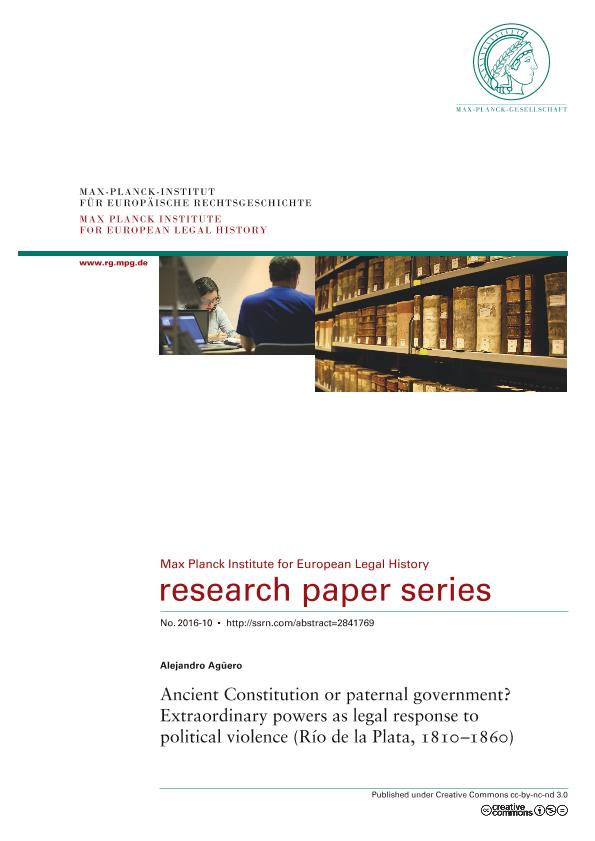Mostrar el registro sencillo del ítem
dc.contributor.author
Aguero, Alejandro

dc.date.available
2022-06-22T15:42:12Z
dc.date.issued
2016-09
dc.identifier.citation
Aguero, Alejandro; Ancient constitution or paternal government? Extraordinary powers as legal response to political violence (Río de la Plata, 1810-1860); Social Science Research Network (SSRN) eLibrary; Max Planck Institute for European Legal History. Research Paper Series; 2016; 10; 9-2016; 1-31
dc.identifier.issn
1619-4993
dc.identifier.uri
http://hdl.handle.net/11336/160219
dc.description.abstract
The regime of caudillos is a common subject in the classic analysis of the first half of the 19th century in Latin America. In the case of Río de la Plata, the experience of caudillos has been subject of academic revision. Scholars have discussed about the cultural background of this phenomena, contrasting their outcomes with the typical picture of a ?lawless realm?. Within this debate, they have proposed new interpretations on the classic topic of the extraordinary powers granted to governors during this period. Considering the extraordinary powers as a sort of legal response to political violence, this paper deals with the historiographical characterizations of such powers, trying to outline a different framework of interpretation. At first, in order to define the ?political violence?, we consider the possible normative meanings of the notion of political crime and its relationship with the diverse cultural backgrounds, pointing out some relevant features of our context of study. In the second place, we analyze the historiographical approaches on caudillo´s regimes and on their extraordinary powers. Rejecting the theses according to which these ?extraordinary powers? took part of a presumed ?ancient constitution?, we suggest that they were rooted both, in a paternal conception of the sovereign, and in the role assigned to the adjectives ordinary / extraordinary in the traditional legal language.NOTA: El Issn corresponde a la revista Legal History, ya que la Research Paper Series se publica en open access en la Social Science Research Network (SSRN) eLibrary.
dc.format
application/pdf
dc.language.iso
eng
dc.publisher
Social Science Research Network (SSRN) eLibrary
dc.rights
info:eu-repo/semantics/openAccess
dc.rights.uri
https://creativecommons.org/licenses/by-nc-sa/2.5/ar/
dc.subject
EXTRAORDINARY POWERS
dc.subject
ANCIENT CONSTITUTION
dc.subject
POLITICAL CRIMES
dc.subject
CAUDILLOS GOVERNMENT
dc.subject.classification
Otras Derecho

dc.subject.classification
Derecho

dc.subject.classification
CIENCIAS SOCIALES

dc.title
Ancient constitution or paternal government? Extraordinary powers as legal response to political violence (Río de la Plata, 1810-1860)
dc.type
info:eu-repo/semantics/article
dc.type
info:ar-repo/semantics/artículo
dc.type
info:eu-repo/semantics/publishedVersion
dc.date.updated
2022-06-21T18:40:46Z
dc.identifier.eissn
2195-9617
dc.journal.volume
2016
dc.journal.number
10
dc.journal.pagination
1-31
dc.journal.pais
Alemania

dc.journal.ciudad
Frankfurt
dc.description.fil
Fil: Aguero, Alejandro. Universidad Nacional de Córdoba. Facultad de Derecho y Ciencias Sociales. Centro de Investigaciones Juridícas y Sociales; Argentina. Consejo Nacional de Investigaciones Científicas y Técnicas; Argentina
dc.journal.title
Max Planck Institute for European Legal History. Research Paper Series
dc.relation.alternativeid
info:eu-repo/semantics/altIdentifier/url/https://papers.ssrn.com/sol3/papers.cfm?abstract_id=2841769
Archivos asociados
